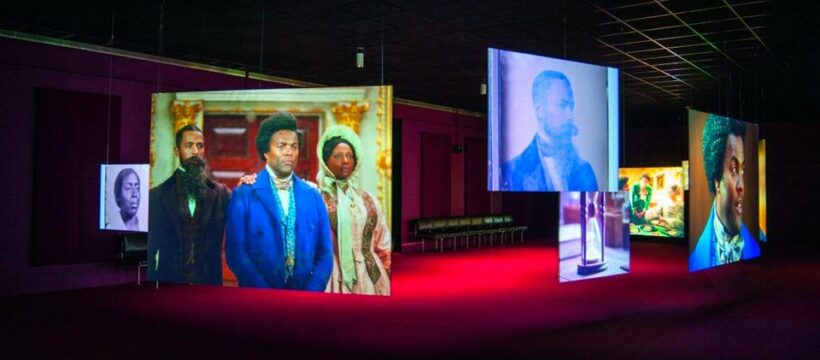Tate Britain is showcasing a moving retrospective exhibition chronicling the career of acclaimed British filmmaker and installation artist, Sir Isaac Julien. Born in East London in 1960, Julien has spent the past 40 years investigating themes related to racism, homophobia, colonial legacies and desire through captivating documentary films that straddle fiction and reality.
As the largest retrospective on the artist to date, What Freedom is to Me, was chosen as the title of the show as an homage to Nina Simone, who once used the phrase in a 1968 interview. The exhibition will feature a number of his most celebrated works, including five single-screen films, along with six floating installations, such as his seminal early films, Looking For Langston (1989) and Vagabondia (2000), as well as newer explorations in Once Again… (Statues Never Die) (2022) and Lessons Of The Hour (2019) — the latter of which was recently chronicled by DelMonico Books.
View this post on Instagram
A post shared by Tate (@tate)
Having debuted at the Berlin International Film Festival of 1989, Looking For Langston explored the private world of poet, social activist and novelist Langston Hughes, who alongside his fellow Black artists and contemporaries of the 1920s would usher in the Harlem Renaissance. The monochromatic film features both historical footage along with fictional recreations where men are shown dancing and kissing in dancehalls, harking back to the lavish ballrooms of the Roaring Twenties. Similar to the Black queer artists and writers of the time, Looking For Langston was a groundbreaking film when it debuted, as it gave representation to Black queer voices in cinema in 1989, which Julien believed “didn’t really exist” during its premier.
Commissioned by the Barnes Foundation, Julien’s five-screen installation, Once Again… (Statues Never Die), observed the relationship of Dr. Albert C. Barnes, who was an early American collector of African art, and cultural critic Alain Locke, who is regarded as the ‘Father of the Harlem Renaissance.’ The film starred Succession‘s Danny Huston as Dr. Albert Barnes, André Holland as Alain Locke, as well as Sharlene Whyte in the role of curator, amongst others.
“Isaac’s been absolutely at the forefront of challenging our ideas around both race and gender and sexuality and queer history,” said Tate director Maria Balshaw, in a past interview. “But he’s also been hugely experimental; he’s expanded the language of moving image and cinema enormously.”
What Freedom is to Me will be on view at Tate Britain until August 20.
Elsewhere, art and AI meet music in new summer-long program at Scorpios Mykonos.
Tate Britain
Millbank
London SW1P 4RG
Source: Read Full Article
